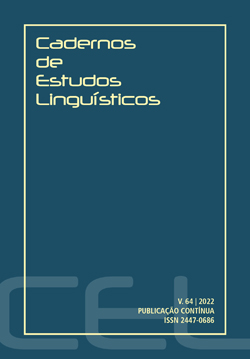Resumen
En este trabajo analizamos bien el adverbio con la lectura de una manera modificando los sintagmas verbales de la región portuguesa. Basándonos en la opinión de que el sintagma verbal puede descomponerse en una estructura de eventos representada sintácticamente, argumentamos que selecciona semánticamente subeventualidades durativas (estados o procesos), y siempre se licenciará en sintagmas verbales que tienen algún componente durativo en su estructura de eventos. En la sección final del artículo, mostramos cómo esta perspectiva explica bien incluso la aparición de adverbios en sintagmas verbales encabezados por verbos típicamente clasificados como culminaciones (achievements). Con esto, creemos que el artículo proporciona no solo una descripción robusta de las propiedades del adverbio bajo análisis (al menos en su interpretación de la forma) sino también un argumento a favor de pensar la estructura del sintagma verbal no como una estructura diseñada por un elemento, sino como una disposición sintáctico-semántica en la que se puede licenciar una raíz verbal.
Citas
ALEXIADOU, Artemis; ANAGNOSTOPOULOU, Elena. Structural Analysis of Unaccusatives. The unaccusativity puzzle: Explorations of the syntax-lexicon interface, v. 5, p. 114, 2004.
BORER, Hagit (2005). The normal course of events. Oxford University Press, Oxford
CASTROVIEJO, Elena; GEHRKE, Berit. A good intensifier. In: JSAI International Symposium on Artificial Intelligence. Springer, Berlin, Heidelberg, 2014. p. 114-129.
CHOMSKY, Noam. The minimalist program. MIT press,1995.
CHOMSKY, Noam. The minimalist program. MIT press, 2015.
CHOMSKY, Noam. 2001. Derivation by phase. In Ken Hale: A Life in Language, ed. Michael Kenstowicz, 1–52. Cambridge, MA: MIT Press.
CINQUE, Guglielmo. Adverbials na Funcional Heads: a cross-linguistic perspective. New York: Oxford University Press. 1999.
CINQUE, Guglielmo. Restructuring and functional heads: the cartography of syntactic structures volume 4. Oxford University Press on Demand, 2006.
CORVER, Norbert. Evidence for DegP. In: North East Linguistics Society. 1991. p. 4.
ERNST, Thomas. Modification of stative predicates. Language, v. 92, n. 2, p. 237-274, 2016.
FLEISCHHAUER, Jens. Degree gradation of verbs. Vol. 2. Düsseldorf University Press, 2016.
GEHRKE, Berit; CASTROVIEJO, Elena. Good manners: On the degree effect of good events. In: Proceedings of Sinn und Bedeutung. 2016. p. 252-269.
GOMES, Ana Paula Quadros; MENDES, Luciana Sanchez. Degree modification in Brazilian Portuguese and in Karitiana. ReVEL, edição especial n. 9, 2015. [www.revel.inf.br]
HALLE, M.; MARANTZ, A. “Distributed Morphology and the Pieces of Inflection”. In: HALE, K.; KEYSER, S. J. (Orgs.). The View From Building Twenty. Cambridge, Mass.: The MIT Press, 1993. p. 110-176.
KATZ, G. (2003). Event arguments, adverb selection, and the Stative Adverb Gap. In E. Lang, C. Maienborn, and C. Fabricius-Hansen (Eds.), Modifying Adjuncts, pp. 455–474. Berlin: de Gruyter.
KENNEDY, Chris. The syntax and semantics of gradability and comparison. University of California, Santa Cruz dissertation, 1997.
KENNEDY, Christopher; MCNALLY, Louise. Scale structure, degree modification, and the semantics of gradable predicates. Language, p. 345-381, 2005.
KRATZER, Angelika. Severing the external argument from its verb. In: Phrase structure and the lexicon. Springer, Dordrecht, 1996. p. 109-137.
KRATZER, Angelika. Building statives. In: Annual Meeting of the Berkeley Linguistics Society. 2000. p. 385-399.
KRATZER, Angelika. Building resultatives. In: Event arguments: Foundations and applications. Max Niemeyer Verlag, 2011. p. 177-212.
LARSON, R. 1998. Events and modification in nominals. In Proceedings from Semantics and Linguistic Theory (SALT) VIII, ed. D. Strolovitch and A. Lawson, 145–168. Ithaca, NY: CLC Publications, Cornell University.
MCNALLY, Louise; KENNEDY, Christopher. Degree vs. manner well: A case study in selective binding. In: Advances in generative lexicon theory. Springer, Dordrecht, 2013. p. 247-262.
MAIENBORN, C. (2005). On the limits of the Davidsonian approach: The case of copula sentences. Theoretical Linguistics 31.3, 275–316.
MAIENBORN, C.: 2004 (Ms., forthcoming), On Davidsonian and Kimian states, in I. Comorowski & K. v. Heusinger (eds), Existence: Semantics and Syntax. Berlin: Springer.
MAIENBORN, C.: 2005, On the Limits of the Davidsonian Approach: The Case of Copula Sentences (Target Article), Theoretical Linguistics 31-3, 275-316
MARANTZ, Alec. “No Escape from Syntax: Don’t Try Morphological Analysis in the Privacy of Your Own Lexicon”. University of Pennsylvania Working Papers in Linguistics, v. 4, n. 2, 1997.
MARANTZ, Alec. Words. Manuscrito, 2001.
MARANTZ, Alec. Argument structure and morphology: noun phrases that name events. Hand-out, New York University, 2006.
MARANTZ, Alec. Restitutive re-and the first phase syntax/semantics of the VP. University of Maryland, 2007.
MARANTZ, Alec. Verbal argument structure: Events and participants. Lingua, v. 130, p. 152-168, 2013.
MCNALLY, L.; C. KENNEDY (2013). Degree vs. manner well: A case study in selective binding. In J. Pustejovsky, P. Bouillon, H. Isahara, K. Kanzaki, and C. Lee (Eds.), Advances in Generative Lexicon Theory, Text, Speech and Language Technology, vol. 46, pp. 247–262. Dordrecht: Springer.
MEDEIROS, A. B. Prefixos, recursividade e a estrutura do sintagma verbal. Revista do GEL, v. 13, n. 1, p. 56-86, 2016.
MEDEIROS, A. B. Considerações sobre a estrutura argumental dos verbos. In: MEDEIROS, A. B.; NEVINS, A. (Orgs.). O apelo das árvores: estudos em homenagem a Miriam Lemle. São Paulo: Pontes, p. 231-298, 2018.
MITTWOCH, A. (2005). Do states have a Davidsonian argument? Some empirical considerations. In C. Maienborn and A. W¨ollstein (Eds.), Event Arguments: Foundations and Applications, pp.69–88. T¨ubingen: Niemeyer.
PARSONS, Terence. Events in the semantics of English: A study in subatomic semantics. 1990.
PYLKKÄNEN, L. Introducing Arguments. Tese (Doutorado em Linguística) – MIT, Cambridge MIT Press, 2002.
PYLKKÄNEN, L. (2008). Introducing arguments (Vol. 49). MIT press.
RAMCHAND, Gillian. Verb meaning and the lexicon: A first-phase syntax. Cambridge: Cambridge University Press, 2008.
TESCARI NETO, A. Sintaxe Gerativa: uma introdução à cartografia sintática. Campinas: Editora da Unicamp, 2022.
ZAMPARELLI, Roberto. Layers in the determiner phrase. 1995. Tese de Doutorado. University of Rochester.

Esta obra está bajo una licencia internacional Creative Commons Atribución-NoComercial 4.0.
Derechos de autor 2022 Cadernos de Estudos Linguísticos


